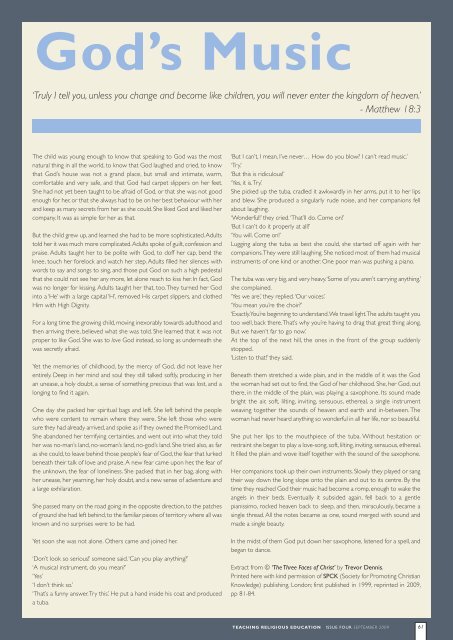TeachingRE Issue 4.pdf - the Second Level Support Service
TeachingRE Issue 4.pdf - the Second Level Support Service
TeachingRE Issue 4.pdf - the Second Level Support Service
You also want an ePaper? Increase the reach of your titles
YUMPU automatically turns print PDFs into web optimized ePapers that Google loves.
God’s Music‘Truly I tell you, unless you change and become like children, you will never enter <strong>the</strong> kingdom of heaven.’- Mat<strong>the</strong>w 18:3The child was young enough to know that speaking to God was <strong>the</strong> mostnatural thing in all <strong>the</strong> world, to know that God laughed and cried, to knowthat God’s house was not a grand place, but small and intimate, warm,comfortable and very safe, and that God had carpet slippers on her feet.She had not yet been taught to be afraid of God, or that she was not goodenough for her, or that she always had to be on her best behaviour with herand keep as many secrets from her as she could. She liked God and liked hercompany. It was as simple for her as that.But <strong>the</strong> child grew up, and learned she had to be more sophisticated.Adultstold her it was much more complicated.Adults spoke of guilt, confession andpraise. Adults taught her to be polite with God, to doff her cap, bend <strong>the</strong>knee, touch her forelock and watch her step. Adults filled her silences withwords to say and songs to sing, and those put God on such a high pedestalthat she could not see her any more, let alone reach to kiss her. In fact, Godwas no longer for kissing. Adults taught her that, too.They turned her Godinto a ‘He’ with a large capital ‘H’, removed His carpet slippers, and clo<strong>the</strong>dHim with High Dignity.For a long time <strong>the</strong> growing child, moving inexorably towards adulthood and<strong>the</strong>n arriving <strong>the</strong>re, believed what she was told. She learned that it was notproper to like God. She was to love God instead, so long as underneath shewas secretly afraid.Yet <strong>the</strong> memories of childhood, by <strong>the</strong> mercy of God, did not leave herentirely. Deep in her mind and soul <strong>the</strong>y still talked softly, producing in heran unease, a holy doubt, a sense of something precious that was lost, and alonging to find it again.One day she packed her spiritual bags and left. She left behind <strong>the</strong> peoplewho were content to remain where <strong>the</strong>y were. She left those who weresure <strong>the</strong>y had already arrived, and spoke as if <strong>the</strong>y owned <strong>the</strong> Promised Land.She abandoned her terrifying certainties, and went out into what <strong>the</strong>y toldher was no-man’s land, no-woman’s land, no-god’s land. She tried also, as faras she could, to leave behind those people’s fear of God, <strong>the</strong> fear that lurkedbeneath <strong>the</strong>ir talk of love and praise. A new fear came upon her, <strong>the</strong> fear of<strong>the</strong> unknown, <strong>the</strong> fear of loneliness. She packed that in her bag, along withher unease, her yearning, her holy doubt, and a new sense of adventure anda large exhilaration.She passed many on <strong>the</strong> road going in <strong>the</strong> opposite direction, to <strong>the</strong> patchesof ground she had left behind, to <strong>the</strong> familiar pieces of territory where all wasknown and no surprises were to be had.Yet soon she was not alone. O<strong>the</strong>rs came and joined her.‘Don’t look so serious!’ someone said.‘Can you play anything?’‘A musical instrument, do you mean?’‘Yes’‘I don’t think so.’‘That’s a funny answer.Try this.’ He put a hand inside his coat and produceda tuba.‘But I can’t, I mean, I’ve never… How do you blow? I can’t read music.’‘Try.’‘But this is ridiculous!’‘Yes, it is.Try.’She picked up <strong>the</strong> tuba, cradled it awkwardly in her arms, put it to her lipsand blew. She produced a singularly rude noise, and her companions fellabout laughing.‘Wonderful!’ <strong>the</strong>y cried.‘That’ll do. Come on!’‘But I can’t do it properly at all!’‘You will. Come on!’Lugging along <strong>the</strong> tuba as best she could, she started off again with hercompanions.They were still laughing. She noticed most of <strong>the</strong>m had musicalinstruments of one kind or ano<strong>the</strong>r. One poor man was pushing a piano.The tuba was very big, and very heavy.‘Some of you aren’t carrying anything,’she complained.‘Yes we are,’ <strong>the</strong>y replied.‘Our voices.’‘You mean you’re <strong>the</strong> choir?’‘Exactly.You’re beginning to understand.We travel light.The adults taught youtoo well, back <strong>the</strong>re.That’s why you’re having to drag that great thing along.But we haven’t far to go now.’At <strong>the</strong> top of <strong>the</strong> next hill, <strong>the</strong> ones in <strong>the</strong> front of <strong>the</strong> group suddenlystopped.‘Listen to that!’ <strong>the</strong>y said.Beneath <strong>the</strong>m stretched a wide plain, and in <strong>the</strong> middle of it was <strong>the</strong> God<strong>the</strong> woman had set out to find, <strong>the</strong> God of her childhood. She, her God, out<strong>the</strong>re, in <strong>the</strong> middle of <strong>the</strong> plain, was playing a saxophone. Its sound madebright <strong>the</strong> air, soft, lilting, inviting, sensuous, e<strong>the</strong>real, a single instrumentweaving toge<strong>the</strong>r <strong>the</strong> sounds of heaven and earth and in-between. Thewoman had never heard anything so wonderful in all her life, nor so beautiful.She put her lips to <strong>the</strong> mouthpiece of <strong>the</strong> tuba. Without hesitation orrestraint she began to play a love-song, soft, lilting, inviting, sensuous, e<strong>the</strong>real.It filled <strong>the</strong> plain and wove itself toge<strong>the</strong>r with <strong>the</strong> sound of <strong>the</strong> saxophone.Her companions took up <strong>the</strong>ir own instruments. Slowly <strong>the</strong>y played or sang<strong>the</strong>ir way down <strong>the</strong> long slope onto <strong>the</strong> plain and out to its centre. By <strong>the</strong>time <strong>the</strong>y reached God <strong>the</strong>ir music had become a romp, enough to wake <strong>the</strong>angels in <strong>the</strong>ir beds. Eventually it subsided again, fell back to a gentlepianissimo, rocked heaven back to sleep, and <strong>the</strong>n, miraculously, became asingle thread. All <strong>the</strong> notes became as one, sound merged with sound andmade a single beauty.In <strong>the</strong> midst of <strong>the</strong>m God put down her saxophone, listened for a spell, andbegan to dance.Extract from © ‘The Three Faces of Christ’ by Trevor Dennis.Printed here with kind permission of SPCK (Society for Promoting ChristianKnowledge) publishing, London; first published in 1999, reprinted in 2009,pp 81-84.TEACHING RELIGIOUS EDUCATION ISSUE FOUR SEPTEMBER 200961


